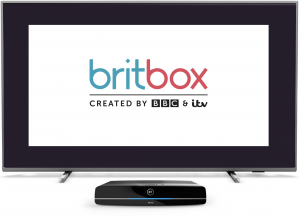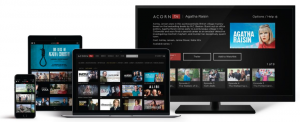Don’t expect BritBox’s expansion to launch it into a Netflix competitor

The announcement that BritBox is to expand into up to 25 countries was a somewhat unexpectedly timed and exceptionally vague one that left more questions than answered.
For starters, the ITV-BBC Studios joint venture failed to actually mention into which countries it would be expanding, giving instead a vague signal towards “Europe, Asia, the Middle East, South America and Africa”
Quoted in the press release announcing the international expansion, Davie said that “We are actively appraising new markets to introduce the service,” indicating that the decision is still up in the air.
The British content streamer initially launched in the US and Canada in 2017 before expanding to the UK last November and recently reached a milestone of one million subscribers. The company had already announced plans for a 2020 Australian launch, but this expansion is undoubtedly the largest undertaking yet.
It’s worth also noting that BritBox has a different structure in the US to in the UK, with the American business being a 50/50 split between ITV and the BBC, while it is 90/10 in favour of the former in the UK. The US structure is likely to be followed in this rollout, but again the details are fuzzy.
It is largely safe to assume that the focus will be on countries with large communities of ex-pat Brits. Australia, as mentioned, will be getting BritBox this year, while the British diaspora is also prominent in Spain, India, New Zealand and South Africa so these countries will undoubtedly have at least been considered internally.
Toby Holleran, senior analyst at Ampere, agrees that these markets, along with the Netherlands and the Nordics will have been considered. He notes: “ITV is an investor in video-on-demand platform Cirkus, which initially launched in the Nordics, offering British content on-demand through pay TV services. As such, ITV will already have some awareness of navigating the Nordic market, and BritBox may appeal to those who do not have pay TV services, or wish to access additional British content alongside that which they get through Cirkus, which is drama/crime-focused.
“In our Consumer surveys of internet users in 22 markets, we ask consumers which type of content they watch regularly – and British content scores quite highly in the Netherlands (25% said they watched it very often), followed by South Africa (23%) and Sweden (20%).”
Knowing that there are Brits and Anglophiles spread across the globe, ITV CEO Carolyn McCall has expressed optimism about the service for the future, and said that the expansion will “firmly establish BritBox as a global premium brand in a rapidly growing sector.”
However, despite this expansion it is unlikely that the service will get close to becoming a worldwide streamer in the coming months and years without it performing very strongly, Ampere’s Holleran says.
“Expanding into 25 countries for a relatively niche service is a large investment, and BritBox is likely already targeting markets where it has the greatest shot to succeed. A further expansion is possible, but any future moves will likely depend on the performance of the service in the current crop of countries.”
In other words, while BritBox is expanding its scope, it is not in a race to take on the Netflixes and Amazons of the world – and this is something the company is aware of.
In an interview with the Telegraph published the day before the expansion was announced, BritBox CEO Reemah Sakaan said that while the service should not be compared to the heavy hitters it should still be taken seriously. She told the paper: “Yes, we can win at being best of British; yes we have a rightful place in the world of streaming; and yes, it is a future lifeline in the digital transformation of both broadcasters.”
This is also down to the budget available for the production of original content. ITV has pledged £65 million for production over the next two years, while the BBC said it will spend “tens of millions of pounds” on making content for the service.
By contrast, Netflix will regularly spend what would be the entire budget of BritBox on a single season of a show. The Crown, for example, is considered a standard bearer for big-budget TV at a reported cost of US$130 million per-season, but even more seemingly stripped-back shows like Orange Is The New Black have a production budget in the tens of millions of dollars.
A tale of two streamers
Clearly, it is not Netflix or Amazon that BritBox is looking to rival. Instead, it is positioned against a similar British-focused product out of the US – Acorn TV.
AMC’s streamer was born out of its Acorn DVD distribution business, so already had a degree of brand recognition. Acorn also launched back in 2013 as a standalone streaming service, so had a few years on BritBox.
Still, now in 2020 the services are on a fairly even level, with both having around one million subscribers across the US and Canada, and expanding to the UK at a similar time – BritBox entered the UK market in November 2019, while Acorn followed suit a few months later in April 2020.
The parallels are not lost on Ampere’s Holleran, but the analyst thinks that it may not be a case of either/or for most consumers.
“Beyond the British aspect, both services have similarly sized catalogues, but with minimal overlap (around 4% of each service’s total catalogue),” he says. “There may be some direct competition between the two services, but both services are relatively cheap (compared to a Netflix for example), and as consumers stack more services, British TV fans may well choose to subscribe to both services, rather than choose a single one.”
Stick or twist
One aspect that may hold BritBox back in its ambitions to conquer markets at home and abroad is a lack of distribution deals with pay TV operators.
Sky, the UK’s leading pay TV operator, reportedly lost interest in doing a deal with BritBox back in December at a time when other services like Netflix and Disney+ have undoubtedly benefited from the added exposure provided by being on the platform.
The streamer does have a distribution deal in place with BT, but its 1.83 million subscribers is small fry when compared to the multiple millions who pay for Sky.
Holleran says that “being available on a pay TV operators’ set top box is beneficial to all services – even if the viewer doesn’t ultimately subscribe, as it serves (to some extent) as free advertising and helps build brand awareness.”
The analyst notes that “BT TV subscribers over-index for BritBox in our latest consumer wave,” suggesting that a deal with the Comcast-owned Sky could be an opportunity to grow the UK audience – particularly given the older-skewing target audience of BritBox who are less digital savvy than the demographics typically watching the likes of Netflix and Now TV.
International expansion is one way for BritBox to grow its subscriber base, but the analysis indicates that there is further opportunity in existing markets through deals with operators
The promotion of BBC Studios head Tim Davie to director general of the entire broadcaster may see the pubcaster become more invested in BritBox, but he will primarily be focused on placating a hostile Conservative government and expanding the BBC’s own iPlayer service.
BritBox CEO Sakaan is a shrewd business woman, and has been tipped as an eventual successor to Davie. But for now she is charged with growing a product while simultaneously not overextending the business model of what is essentially a niche service with limited funding from operators whose main priorities lie elsewhere.
This expansion indicates that Sakaan, who was instrumental behind the launch of the joint-venture service (which she initially proposed in 2007 as a project dubbed ‘Kangaroo’, which would have also included Channel 4) is serious about moving it forward to being a revenue generator for ITV and the BBC. But any suggestion that this expansion could see the service become a serious Netflix rival is wishful thinking – particularly with current details as vague as they are.






